2022届高考英语二轮复习:冠词用法课件(52张)
文档属性
| 名称 | 2022届高考英语二轮复习:冠词用法课件(52张) | 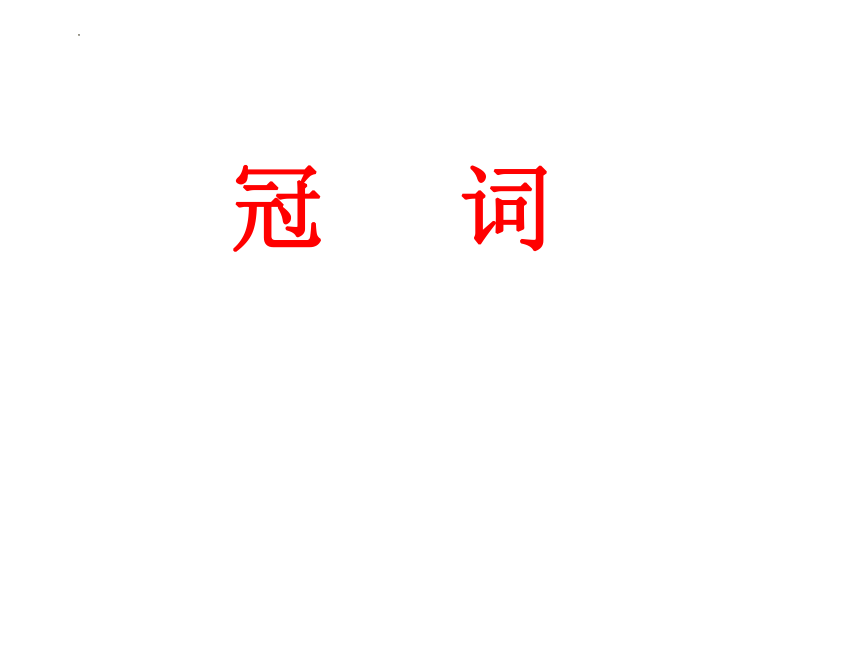 | |
| 格式 | zip | ||
| 文件大小 | 153.3KB | ||
| 资源类型 | 教案 | ||
| 版本资源 | 通用版 | ||
| 科目 | 英语 | ||
| 更新时间 | 2022-05-03 08:43:11 | ||
图片预览

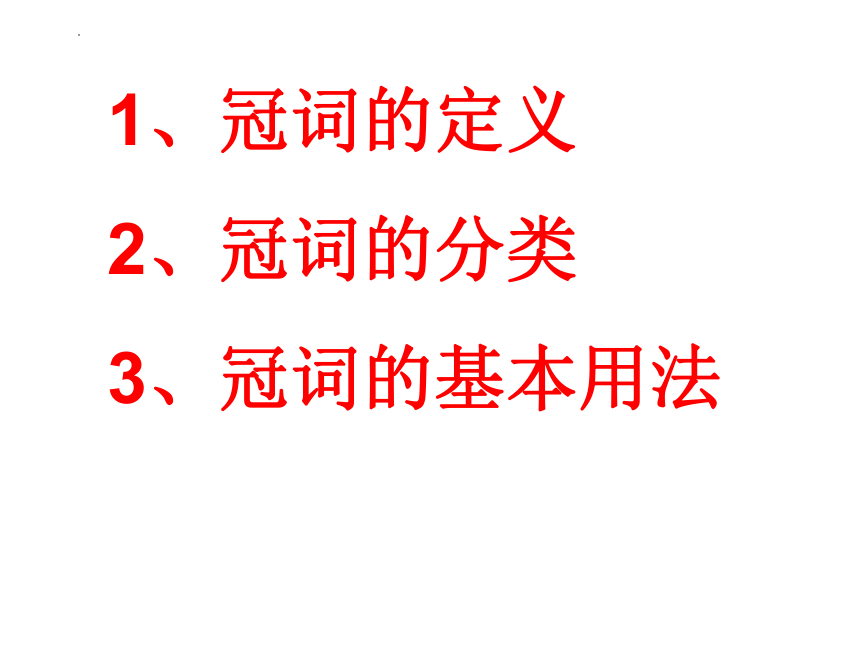
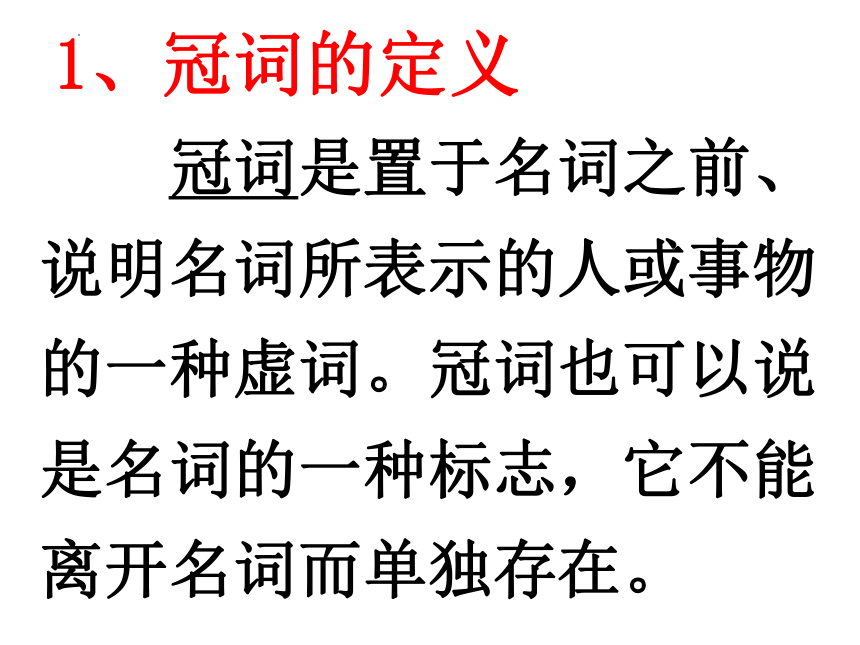
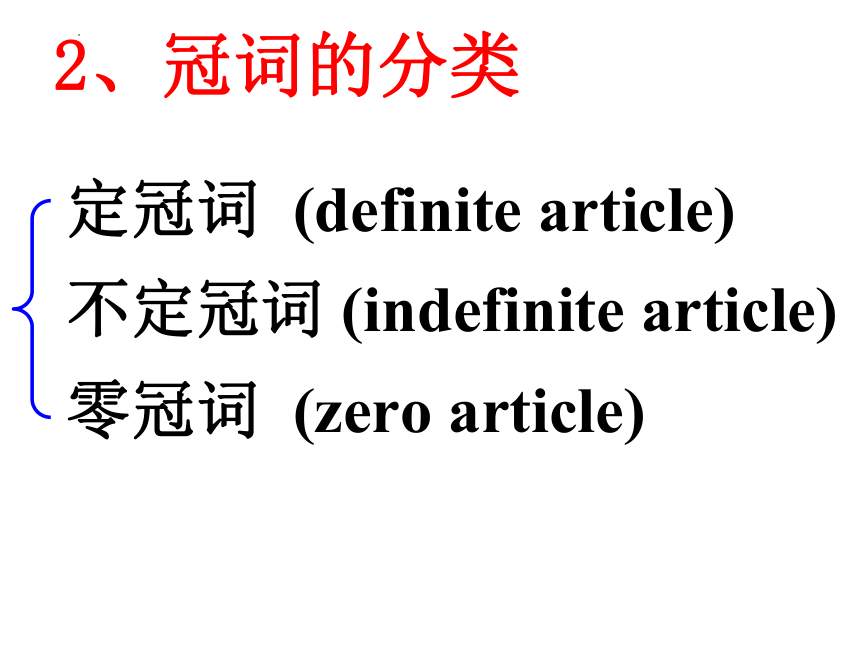
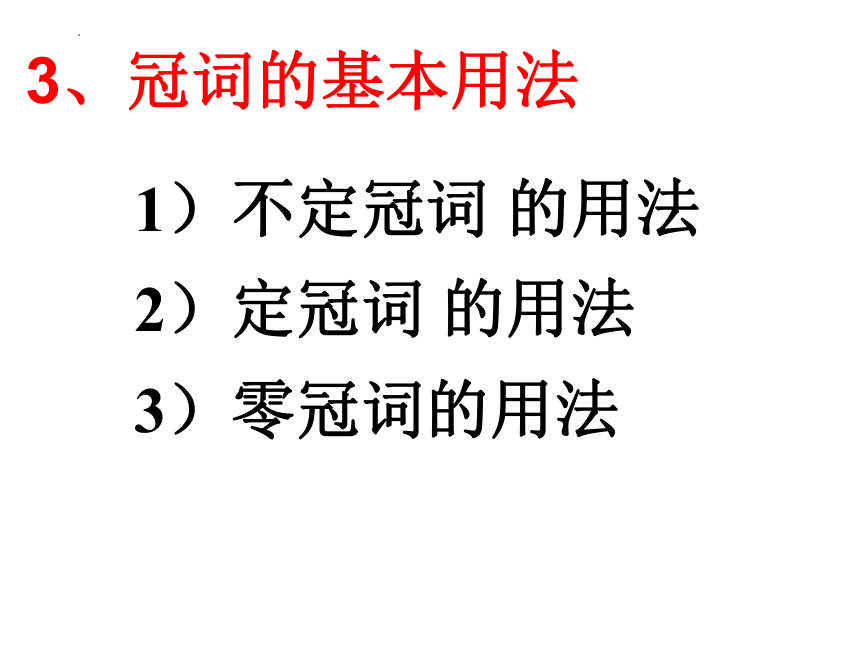
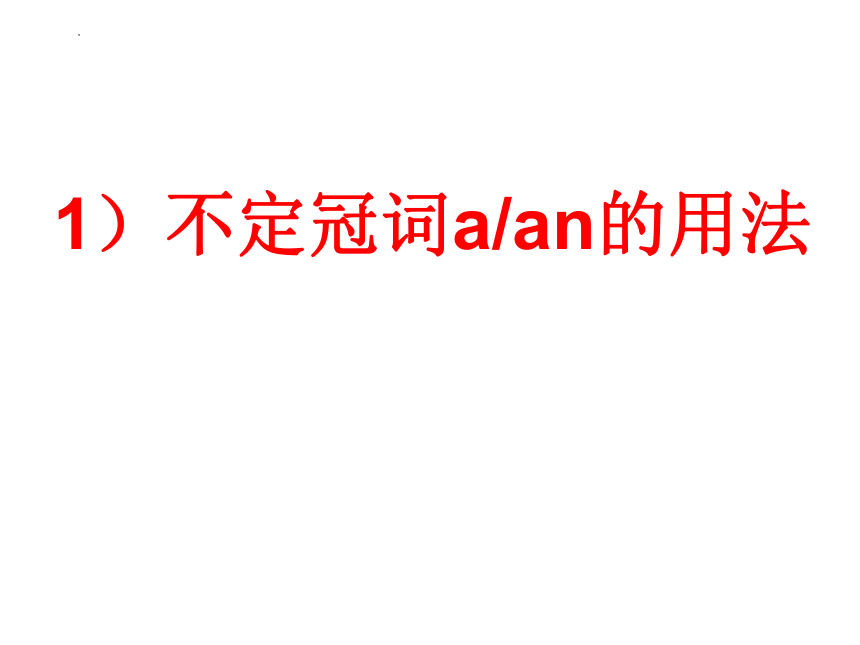
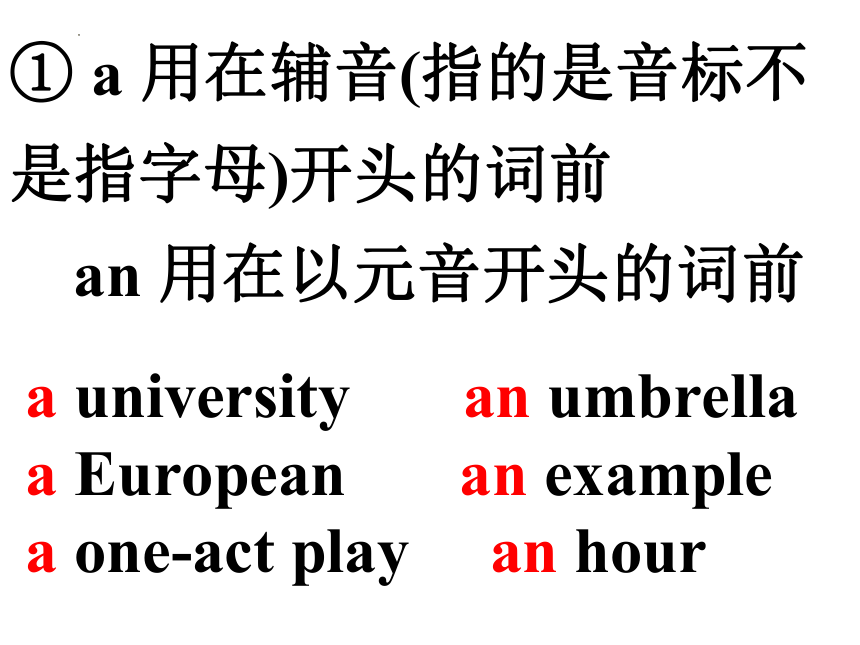
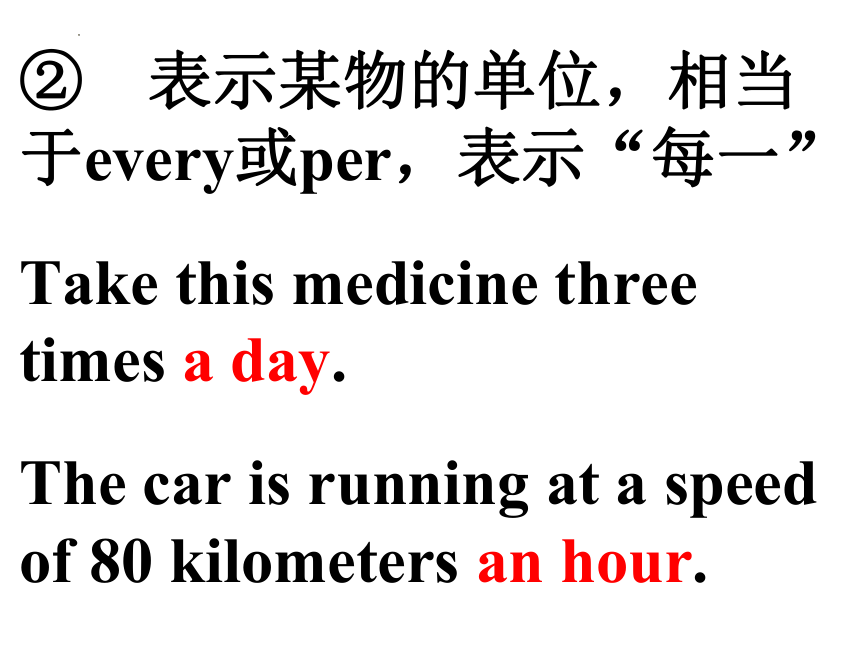
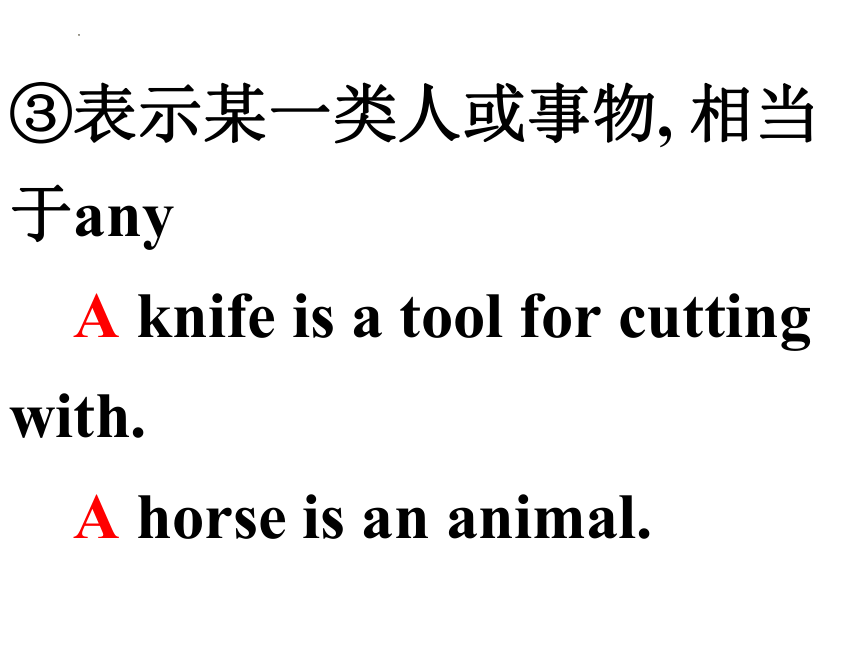
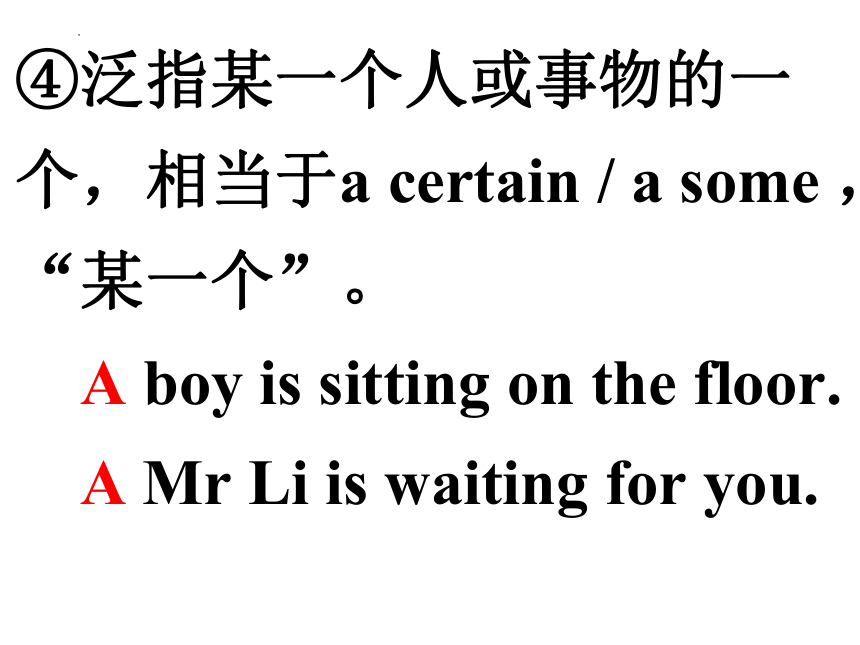
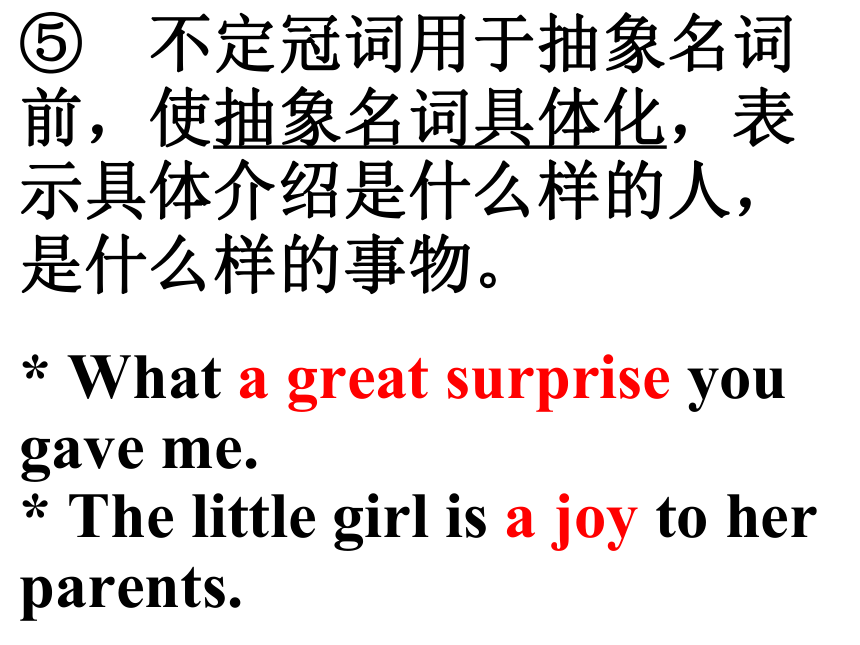
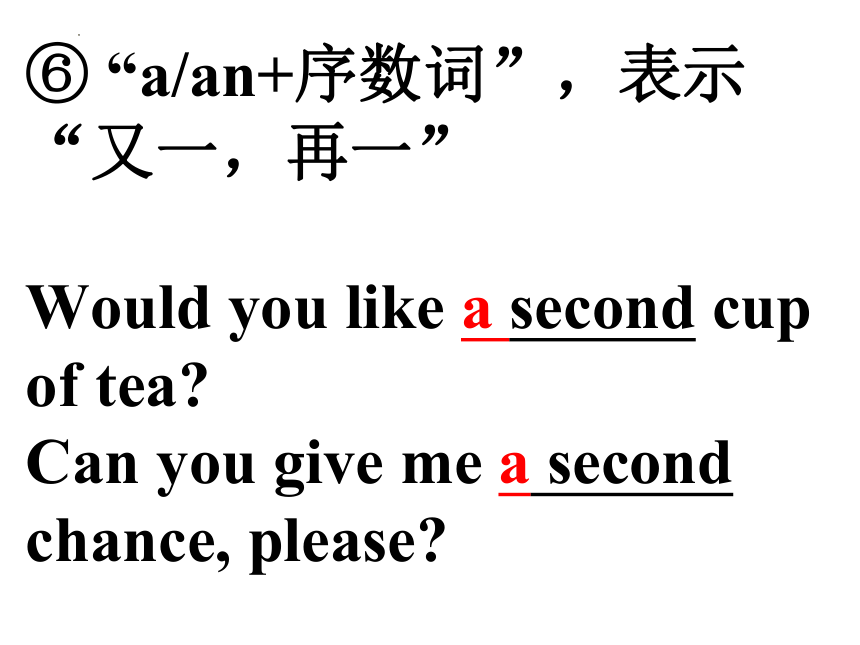
文档简介
(共52张PPT)
冠 词
1、冠词的定义
2、冠词的分类
3、冠词的基本用法
1、冠词的定义
冠词是置于名词之前、说明名词所表示的人或事物的一种虚词。冠词也可以说是名词的一种标志,它不能离开名词而单独存在。
2、冠词的分类
定冠词 (definite article)
不定冠词 (indefinite article)
零冠词 (zero article)
3、冠词的基本用法
1)不定冠词 的用法
2)定冠词 的用法
3)零冠词的用法
1)不定冠词a/an的用法
① a 用在辅音(指的是音标不是指字母)开头的词前
an 用在以元音开头的词前
a university an umbrella
a European an example
a one-act play an hour
② 表示某物的单位,相当于every或per,表示“每一”
Take this medicine three times a day.
The car is running at a speed of 80 kilometers an hour.
③表示某一类人或事物, 相当于any
A knife is a tool for cutting with.
A horse is an animal.
④泛指某一个人或事物的一个,相当于a certain / a some ,“某一个”。
A boy is sitting on the floor.
A Mr Li is waiting for you.
⑤ 不定冠词用于抽象名词前,使抽象名词具体化,表示具体介绍是什么样的人,是什么样的事物。
* What a great surprise you gave me.
* The little girl is a joy to her parents.
⑥ “a/an+序数词”,表示“又一,再一”
Would you like a second cup of tea
Can you give me a second chance, please
⑦用于有形容词修饰的一日三餐、季节前
I had a wonderful breakfast this morning.
⑧ 不定冠词用于形容词最高级前,表示“很,非常”。
It is a most useful tool.
这是一件很有用的工具。
⑨ 不定冠词用在副词too, so, as, how加形容词后, 修饰名词
+
so/as/too/ how
however
a/an+单数名词
adj.
+
This is too difficult a problem for me.
She is so clever a girl that all of us like her.
⑩ 用在what后,修饰名词
What a/an + n.
What a beautiful girl !
How beautiful a girl!
11 用于某些固定短语中
have a cold / fever
have a good time
in a hurry
tell a lie
do sb. a favor 帮忙
at a loss 不知所措
for a while
once in a while 偶尔,间或
all of a sudden 突然
have a walk/ rest/ talk/ look
a good many 许多
2)定冠词the的用法
⑴ 表示上文提到的人或物,或表示说话人双方都知道的人或物。
Close the window, please!
I bought a book yesterday.
The book is very interesting.
⑵ 定冠词用于世界上独一无二的人或事物前、表示方位或发明物等的名词前。
the sun, the moon, the earth the sky, the world,
the west the north
Alexander Graham Bell invented the telephone in 1876.
但:有些物体虽然也是独一无二的,但习惯上却不用冠词
space 太空 nature 自然
man 人类 society社会
但:在表示泛指或在特定的情景中可用不定冠词
a red hot sun
a beautiful round moon
a peaceful world
* It’s ____ world of wonders, ___ world where everything can happen.
A. a, the B. a, a
C. the, a D. /, /
⑶ 用于序数词和形容词最高级前
the first
the second
the most important
the best
⑷用在某些形容词、分词前,表示一类人或事物, 或用在姓氏复数前表示一家人或夫妇俩。
the poor the rich
the Lis
⑸ 用于西洋乐器名词,表示“演奏......”
play the piano
play the guitar
⑹用于计量单位的名词前,表示“按......,每......”
Pencils are sold by the dozen.
by the metre, by the month
但:by weight/ size/ height
by length/width
按重量/大小/高度/长度/宽度
⑺ 用于“the+比较级”的句型中,表示“越……越……”
The more, the better. 越多越好。
⑻ 表示两者中“较……的一个”
He is the taller of the two boys.
⑼ 用于very/only/right/ same / following之前
* the following day 第二天
* Don’t make the same mistake.
* That’s the very thing I’ve been looking for.
⑽ 用于表示世纪、年代、时期或朝代的名词前。
in the 1980s/ 1980’s
in the Ming Dynasty
⑾ 用于可数名词的单数前,表示类别。
The horse is a kind of useful animal.
总结:三种表示类别的情况:
1、“定冠词+单数可数名词”可表示特指,用特指的那一事物代表一类事物。
Galileo invented the telescope that year. (望远镜这一类发明物)
总结:三种表示 类别 的情况:
2、“不定冠词+单数可数名词”可表示泛指,用泛指的任意一个所具有的特征、特性表示一类事物。
A dog is a faithful animal.
狗是忠诚的朋友。
总结:三种表示 类别 的情况:
3、用可数名词的复数或用不可数名词来表示一类事物。
Horses are bigger than pigs.
Iron is cheaper than gold.
⑿ 用于普通名词构成的专有名词前,以及江河湖海、山川、群岛等名词前。
the United Nations 联合国
the Middle Ages 中世纪
the Himalayas 喜马拉雅山
the Suez Canal 苏伊士运河
the Pacific 太平洋
the Yangtze River 长江
the Great Wall 长城
the Summer Palace 颐和园
⒀ 用在句型 “动词+人+介词+the+人体某部位”,表示“抓/拍某人某部位”
* take sb. by the arm/hand
抓住某人的臂/手
* Pat sb. on the shoulder 拍肩
* strike sb. in the face 打脸
* hit sb. on the head 打头
⒁ 用在一些固定搭配
in the morning/afternoon
in the end
on the whole 总之
go to the cinema
all the year round
by the way
for the time being 暂时
in the way 挡道
on the other hand
3) 零冠词的用法
⑴ 不可数名词、复数名词表泛指,用零冠词。
Horses are bigger than pigs.
Iron is cheaper than gold.
但:抽象名词具体化时,要用冠词。
⑵ 称呼语及表示独一无二的头衔、职务的名词作宾语补足语、主语补足语、同位语时,零冠词
* Mr Bush, president of USA, will visit Japan next month.
* We made Jack monitor.
* What’s wrong with you, Uncle
the
/
Do you know that ______ chairman of the meeting has announced the young lady has been made _____ manager of this factory
⑶ “by+交通工具”,零冠词。
by car/ bike/ bus/ boat/ plane
on foot
但:in a car/ boat
on a bike/ bus take a bus
⑷ 球类、棋类运动,一日三餐、学科、语言的名词前
play football, play chess
have supper/ dinner/lunch
study English/ physics
注意:a beautiful football
have a nice supper
the Japanese language
⑸季节、月份、星期、节日的名词前零冠词
in summer/ spring
in May/ October
New Year’s Day
Mid-autumn Day
但:the Spring Festival
the Mid-autumn Festival
⑹前面已有人称代词、指示代词或不定代词修饰,零冠词
His house is very big.
This garden is newly built.
Each member has a computer.
⑺表示“按……销售/计算/付报酬”时,抽象名词前不用冠词,但具体的单位前用定冠词。
by length/time/weight/size
by the meter, by the hour
by the kilo, by the dozen
⑻有无冠词,短语意思不同
go to school
go to the school
at sea
at the sea
out of question
out of the question
上学
到学校去
出海,在海上
在海边
毫无疑问
不可能,办不到
by day
by the day
by sea
by the sea
in place of
in the place of
在白天
按天计算
乘船
在海边,海滨
代替
在……的地方
be in charge of
be in the charge of
four of us
the four of us
负责
由……负责
我们中的四人
我们四人
⑼ 固定词组
day and night
day after day
hand in hand
body and soul 身心
from door to door 挨家挨户
at noon/ night
in case of
catch sight of 看见
冠 词
1、冠词的定义
2、冠词的分类
3、冠词的基本用法
1、冠词的定义
冠词是置于名词之前、说明名词所表示的人或事物的一种虚词。冠词也可以说是名词的一种标志,它不能离开名词而单独存在。
2、冠词的分类
定冠词 (definite article)
不定冠词 (indefinite article)
零冠词 (zero article)
3、冠词的基本用法
1)不定冠词 的用法
2)定冠词 的用法
3)零冠词的用法
1)不定冠词a/an的用法
① a 用在辅音(指的是音标不是指字母)开头的词前
an 用在以元音开头的词前
a university an umbrella
a European an example
a one-act play an hour
② 表示某物的单位,相当于every或per,表示“每一”
Take this medicine three times a day.
The car is running at a speed of 80 kilometers an hour.
③表示某一类人或事物, 相当于any
A knife is a tool for cutting with.
A horse is an animal.
④泛指某一个人或事物的一个,相当于a certain / a some ,“某一个”。
A boy is sitting on the floor.
A Mr Li is waiting for you.
⑤ 不定冠词用于抽象名词前,使抽象名词具体化,表示具体介绍是什么样的人,是什么样的事物。
* What a great surprise you gave me.
* The little girl is a joy to her parents.
⑥ “a/an+序数词”,表示“又一,再一”
Would you like a second cup of tea
Can you give me a second chance, please
⑦用于有形容词修饰的一日三餐、季节前
I had a wonderful breakfast this morning.
⑧ 不定冠词用于形容词最高级前,表示“很,非常”。
It is a most useful tool.
这是一件很有用的工具。
⑨ 不定冠词用在副词too, so, as, how加形容词后, 修饰名词
+
so/as/too/ how
however
a/an+单数名词
adj.
+
This is too difficult a problem for me.
She is so clever a girl that all of us like her.
⑩ 用在what后,修饰名词
What a/an + n.
What a beautiful girl !
How beautiful a girl!
11 用于某些固定短语中
have a cold / fever
have a good time
in a hurry
tell a lie
do sb. a favor 帮忙
at a loss 不知所措
for a while
once in a while 偶尔,间或
all of a sudden 突然
have a walk/ rest/ talk/ look
a good many 许多
2)定冠词the的用法
⑴ 表示上文提到的人或物,或表示说话人双方都知道的人或物。
Close the window, please!
I bought a book yesterday.
The book is very interesting.
⑵ 定冠词用于世界上独一无二的人或事物前、表示方位或发明物等的名词前。
the sun, the moon, the earth the sky, the world,
the west the north
Alexander Graham Bell invented the telephone in 1876.
但:有些物体虽然也是独一无二的,但习惯上却不用冠词
space 太空 nature 自然
man 人类 society社会
但:在表示泛指或在特定的情景中可用不定冠词
a red hot sun
a beautiful round moon
a peaceful world
* It’s ____ world of wonders, ___ world where everything can happen.
A. a, the B. a, a
C. the, a D. /, /
⑶ 用于序数词和形容词最高级前
the first
the second
the most important
the best
⑷用在某些形容词、分词前,表示一类人或事物, 或用在姓氏复数前表示一家人或夫妇俩。
the poor the rich
the Lis
⑸ 用于西洋乐器名词,表示“演奏......”
play the piano
play the guitar
⑹用于计量单位的名词前,表示“按......,每......”
Pencils are sold by the dozen.
by the metre, by the month
但:by weight/ size/ height
by length/width
按重量/大小/高度/长度/宽度
⑺ 用于“the+比较级”的句型中,表示“越……越……”
The more, the better. 越多越好。
⑻ 表示两者中“较……的一个”
He is the taller of the two boys.
⑼ 用于very/only/right/ same / following之前
* the following day 第二天
* Don’t make the same mistake.
* That’s the very thing I’ve been looking for.
⑽ 用于表示世纪、年代、时期或朝代的名词前。
in the 1980s/ 1980’s
in the Ming Dynasty
⑾ 用于可数名词的单数前,表示类别。
The horse is a kind of useful animal.
总结:三种表示类别的情况:
1、“定冠词+单数可数名词”可表示特指,用特指的那一事物代表一类事物。
Galileo invented the telescope that year. (望远镜这一类发明物)
总结:三种表示 类别 的情况:
2、“不定冠词+单数可数名词”可表示泛指,用泛指的任意一个所具有的特征、特性表示一类事物。
A dog is a faithful animal.
狗是忠诚的朋友。
总结:三种表示 类别 的情况:
3、用可数名词的复数或用不可数名词来表示一类事物。
Horses are bigger than pigs.
Iron is cheaper than gold.
⑿ 用于普通名词构成的专有名词前,以及江河湖海、山川、群岛等名词前。
the United Nations 联合国
the Middle Ages 中世纪
the Himalayas 喜马拉雅山
the Suez Canal 苏伊士运河
the Pacific 太平洋
the Yangtze River 长江
the Great Wall 长城
the Summer Palace 颐和园
⒀ 用在句型 “动词+人+介词+the+人体某部位”,表示“抓/拍某人某部位”
* take sb. by the arm/hand
抓住某人的臂/手
* Pat sb. on the shoulder 拍肩
* strike sb. in the face 打脸
* hit sb. on the head 打头
⒁ 用在一些固定搭配
in the morning/afternoon
in the end
on the whole 总之
go to the cinema
all the year round
by the way
for the time being 暂时
in the way 挡道
on the other hand
3) 零冠词的用法
⑴ 不可数名词、复数名词表泛指,用零冠词。
Horses are bigger than pigs.
Iron is cheaper than gold.
但:抽象名词具体化时,要用冠词。
⑵ 称呼语及表示独一无二的头衔、职务的名词作宾语补足语、主语补足语、同位语时,零冠词
* Mr Bush, president of USA, will visit Japan next month.
* We made Jack monitor.
* What’s wrong with you, Uncle
the
/
Do you know that ______ chairman of the meeting has announced the young lady has been made _____ manager of this factory
⑶ “by+交通工具”,零冠词。
by car/ bike/ bus/ boat/ plane
on foot
但:in a car/ boat
on a bike/ bus take a bus
⑷ 球类、棋类运动,一日三餐、学科、语言的名词前
play football, play chess
have supper/ dinner/lunch
study English/ physics
注意:a beautiful football
have a nice supper
the Japanese language
⑸季节、月份、星期、节日的名词前零冠词
in summer/ spring
in May/ October
New Year’s Day
Mid-autumn Day
但:the Spring Festival
the Mid-autumn Festival
⑹前面已有人称代词、指示代词或不定代词修饰,零冠词
His house is very big.
This garden is newly built.
Each member has a computer.
⑺表示“按……销售/计算/付报酬”时,抽象名词前不用冠词,但具体的单位前用定冠词。
by length/time/weight/size
by the meter, by the hour
by the kilo, by the dozen
⑻有无冠词,短语意思不同
go to school
go to the school
at sea
at the sea
out of question
out of the question
上学
到学校去
出海,在海上
在海边
毫无疑问
不可能,办不到
by day
by the day
by sea
by the sea
in place of
in the place of
在白天
按天计算
乘船
在海边,海滨
代替
在……的地方
be in charge of
be in the charge of
four of us
the four of us
负责
由……负责
我们中的四人
我们四人
⑼ 固定词组
day and night
day after day
hand in hand
body and soul 身心
from door to door 挨家挨户
at noon/ night
in case of
catch sight of 看见
